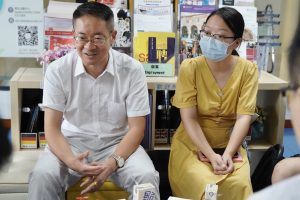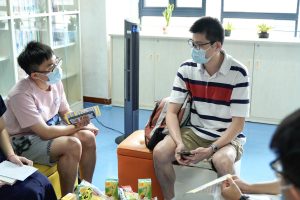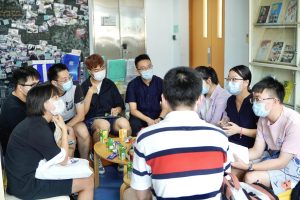Each academic year, the Student Affairs Office (SAO) organises a series of ‘Tea with Professor’ activities, during which students seek advice from their professors. The first two tea gatherings held this year were respectively hosted by Prof Ouyang Defang, an associate professor in the Institute of Chinese Medical Sciences, and Prof Zhang Yibo, an associate professor in the Department of Computer and Information Science. Both shared their experience in postgraduate studies.
Data Analysis Skills Benefit Professional Development
Prof Ouyang completed his PhD in pharmacy at the University of Queensland in Australia. His main research interests are pharmaceutics and computer modelling. By integrating technologies in multi-scale modelling, artificial intelligence, and big data, he created a new research area called ‘computational pharmaceutics’. It was inspired by his working experience in a pharmaceutical manufacturing plant in mainland China during his postgraduate studies. At that time, Prof Ouyang and his colleagues conducted numerous experiments about medicine. They had to go through cumbersome procedures because of a lack of mature technologies and machines in mainland China. So he began to wonder if they could use computers to analyse the data so as to speed up the experiments. ‘I shared this thought with my professor but he said there had been no precedents, so I had no choice but to give up,’ he says. It was not until Prof Ouyang went to Australia to study for a PhD that he began to learn computational simulation and data analysis skills from professors at the University of Queensland. Prof Ouyang says those who plan to pursue postgraduate studies should consider learning some programming languages, such as Python, because these skills will benefit their professional development.
Try to Gain Research Experience and Publish Papers
At another tea gathering, Prof Zhang shared what it takes to succeed in graduate school. Prof Zhang grew up in Canada and completed his undergraduate, master’s, and PhD degrees there. He obtained his PhD degree in electrical and computer engineering from the University of Waterloo in 2011. Prof Zhang says in selecting candidates for PhD programmes, apart from considering whether the applicant’s major is relevant to the programme and whether the grades are good, universities also care about whether the candidate has published high-quality papers. He advises undergraduates to evaluate whether they have enough time to conduct research before deciding to pursue postgraduate studies. ‘My advice is: always work hard and be brave enough to try your area of interest before choosing a path that suits you best,’ he says.
Prepare Yourself for Postgraduate Studies
After two tea gatherings, Sam Liu, a postgraduate student in the Department of Computer and Information Science, who is planning to study for a PhD, says, ‘Prof Ouyang became clear about what he wanted to focus on in his research while working in a pharmaceutical manufacturing plant, which means that working experience is useful. It makes me stop agonising over whether to pursue further studies or find a job after graduation.’
Ruby Lyu, a postgraduate student in the Master of Science (Data Science) programme, also attended the two tea gatherings. She says: ‘I joined the events to learn from the professors and talk to other students in order to learn more information about further studies. Prof Zhang’s advice is very specific and helpful. I have learned how to prepare myself for PhD application, and I will also try my best to publish as many high-quality articles as I can.’



